How to look for records of... Black British social and political history in the 20th century
How can I view the records covered in this guide?
How many are online?
- Some
Contents
- 1. Why use this guide?
- 2. Key events, organisations and legislation
- 3. How to view records
- 4. What records can I view online?
- 5. How our catalogue works
- 6. Searching our catalogue for records
- 7. Government policy on race relations
- 8. Civil rights struggles in the UK
- 9. Race Relations Board and Commission for Racial Equality
- 10. Employment and industrial relations
- 11. Records in other archives
- 12. Further reading
1. Why use this guide?
This guide will help you to find records relating to the experience and influence of black British people in the 20th century. It focuses on the records held here, at The National Archives, that relate to civil rights and race relations. It will also direct you to records held elsewhere.
If you are interested in earlier records, browse our ‘Help with your research’ page to find other suitable research guides. If your interest is family history you should start with the research guides under the family history category.
For the purposes of this guide, we use ‘black British’ to mean Britons with African and Caribbean ancestry. There is ongoing discussion about terminology relating to race, and we welcome your views on our approach.
2. Key events, organisations and legislation
Some key events, organisations and legislation that it might be useful to know about:
- 1919 uprisings in London, Cardiff and Liverpool
- 1931 Dr Harold Moody establishes the League of Coloured Peoples
- 1948 British Nationality Act
- 1948 SS Empire Windrush arrives at Tilbury
- 1958 uprisings in London and Nottingham
- 1962 Commonwealth Immigrants Act
- 1958-1966 Notting Hill Carnival begins (exact date is disputed)
- 1963 Bristol bus boycott
- 1965, 1968 and 1975 Race Relations Acts
- 1967 British Black Panther party established
- 1970 Trial of the Mangrove Nine
- 1979 Royal Commission on Criminal Procedure (led to repeal of the ‘Sus laws’)
- 1981 Brixton uprisings and Lord Scarman report
- 1999 Macpherson Report published following the Stephen Lawrence Inquiry
We know there are records in our collection that refer to some of these events, but we have not found records that relate to all of them. If you come across information in your research that you think would be of interest to other researchers, please email us.
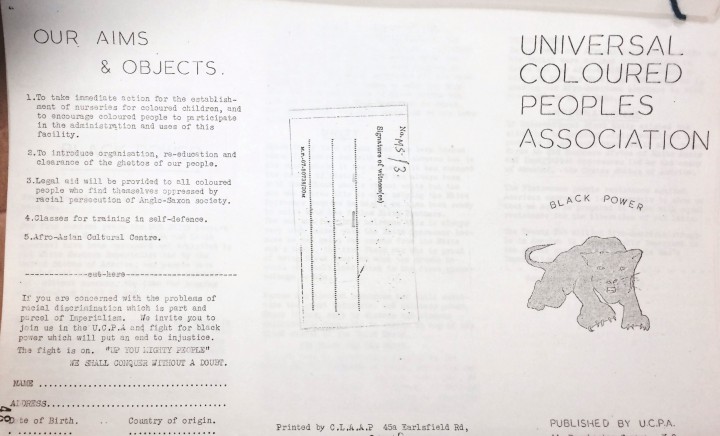
Image of Universal Coloured Peoples Association Pamphlet from MEPO 2/11409
3. How to view records
Discovery, our catalogue, lists records held by The National Archives as well as over 2500 other archives in the UK and some abroad. The arrangements to see records will vary between archives.
For records held by The National Archives, the online catalogue description will indicate whether you can view records online. For records not available online, the catalogue description will include an option to order paper or digital copies to be sent to you.
You can also visit us to do your research here in person – check our website for opening hours, closure dates and details of the two valid forms of ID you must bring to look at original documents. If you can’t visit in person you can request a paid search.
If the catalogue description shows the records are held at another archive you will need to contact that archive directly for access arrangements.
4. What records can I view online?
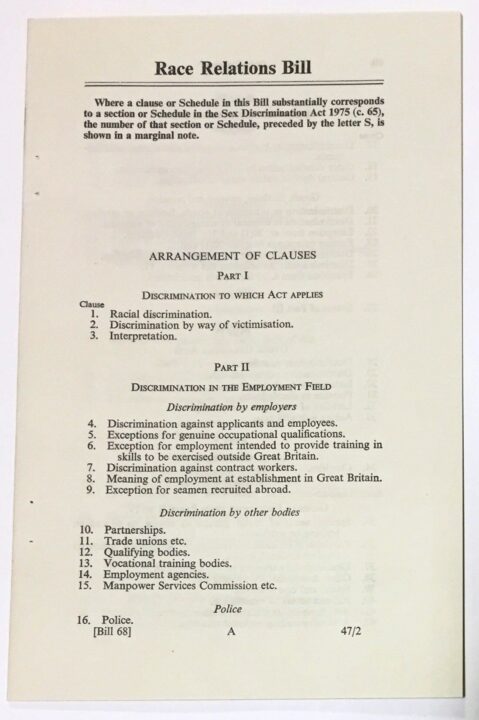
Race Relations Bill 1976 (catalogue reference: AST 18/128)
Some useful collections of records are available online. They represent mostly high level official activity, but there are also some records with a more personal flavour.
4.1 Cabinet papers
Read our research guide to Cabinet and its committees for advice on searching our catalogue for cabinet papers.
The archived Cabinet Papers site has themed pages which you can browse, some with links to downloadable documents. The theme of ‘Law, liberty and society’ covers Cabinet papers on race relations but you might also find useful material under other themes.
4.2 Parliamentary papers 1715 to date
Search Parliamentary papers from 1715 to the present. This collection includes full texts of House of Commons Parliamentary Papers as well as Hansard (the record of debates and proceedings at the Houses of Parliament). It also includes some House of Lords Sessional Papers; local, private and personal acts; and journals of the Houses of Lords and Commons for the 18th century.
Online parliamentary papers are available to view at The National Archives building in Kew and through libraries or other institutions with a ProQuest account.
4.3 Legislation
Search legislation.gov.uk for relevant legislation. This could include specific race relations legislation but also legislation such as the 1824 Vagrancy Act (‘Sus law’) which caused conflict and protest.
4.4 Moving here
Browse the Moving Here website under the Caribbean heading. Sections on working lives, politics and culture and festivals include some digitised original documents. Please note that this website has been archived and is no longer updated so some of the functions may no longer work.
4.5 British Newspaper Archive
Search the British Newspaper Archive (), also available over Findmypast (), and The Times Digital Archive (institutional subscription required) for articles relating to political and social history.
Local libraries may have their own subscriptions to these online archives that you can use.
As when searching within other archives you should search using the language of the time to find relevant reports and articles. You can also search for particular people, places and events by name.
5. How our catalogue works
Discovery, our catalogue, contains descriptions of records held by us and over 2,500 other archives across the UK and some abroad.
The record titles and descriptions were written at the time the records were created. Quite often they use language that is now out of date and sometimes offensive, but once records are transferred to us we don’t alter them. The terminology used by the people that created the records is part of the story they tell.
The records relating to the civil rights protests and race relations legislation of the 20th century are relatively easy to identify because the record descriptions often include references to race.
In most other instances there will be nothing in the record description to indicate whether it is specifically relevant to black British history. You will need to be creative and speculative in how you search.
6. Searching our catalogue for records
Use the main Discovery search or the Advanced search page. Try the search strategies outlined below.
The advanced search option allows you to build your searches more precisely by restricting dates and other criteria from the start. Other sections of this guide will give you some ideas about which National Archives departments and series to search within. For more information about using Discovery effectively see Discovery help.
6.1 Using broad searches
Search using broad terms that will produce plenty of results but may not all be relevant. Use the filters on the search results page to narrow down your results by date, government department and other criteria. Try terms such as:
- race relations
- racism
- racial discrimination
- colour bar
- prejudice
- civil rights
- black power
6.2 Using specific search terms
Search more specifically such as around employment, housing and education using terms such as:
- black
- colour and coloured
- Caribbean and West Indian
- African
Combine these terms with: workers, employees, employment, students, tenants, landlords, housing, immigration and immigrants or other words relevant to your research.
6.3 Searching for people and events
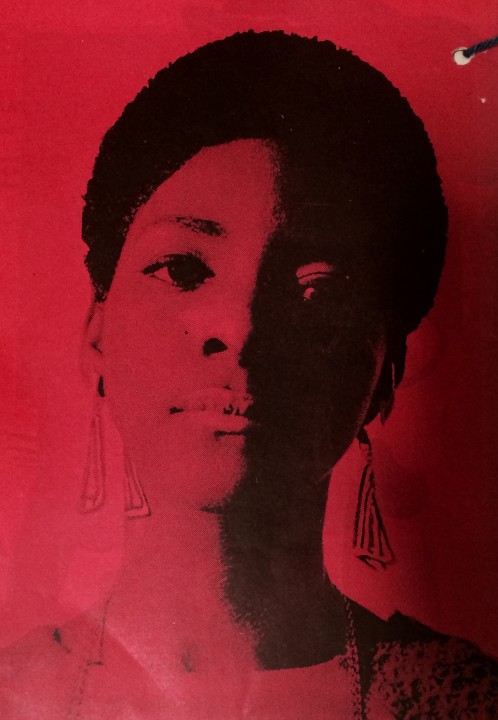
Image from back page of Black Power Speaks, Vol. 3 (catalogue reference: MEPO 2/11409)
Search more specifically around people or events, some of which are highlighted at section 2. Try searching for:
- names of activists (though many names that appear in the content of the records do not appear in the catalogue titles or descriptions)
- names of political organisations
- particular protest action such as marches and uprisings (use the search term ‘riot’)
- court cases, legislation and public enquiries
If you come across any material or search terms that might be useful to others interested in this subject we would like to hear from you. Please email us about your research experience.
7. Government policy on race relations
During the 20th century, increased government recognition of discrimination led to changes in policy.
Try searching the catalogue using ‘policy’ combined with relevant terms such as:
- racial or race discrimination
- coloured people
- West Indian, Caribbean, African
- immigration
A general search of the catalogue for ‘race relations policy‘ finds records from key government departments such as:
- Commission for Racial Equality (CK)
- Cabinet Office (CAB)
- Department of Employment (LAB)
- Home Office (HO)
Getting an understanding of the departments involved in policy can help to inform further searches.
Use the Advanced search option in Discovery to search within the records of one or more of these departments in more depth to find records relating to the development and implementation of policy. Discovery help explains how to do this.
8. Civil rights struggles in the UK
Records at The National Archives reflect the government’s response to the civil rights movement in the UK and also that in the United States.
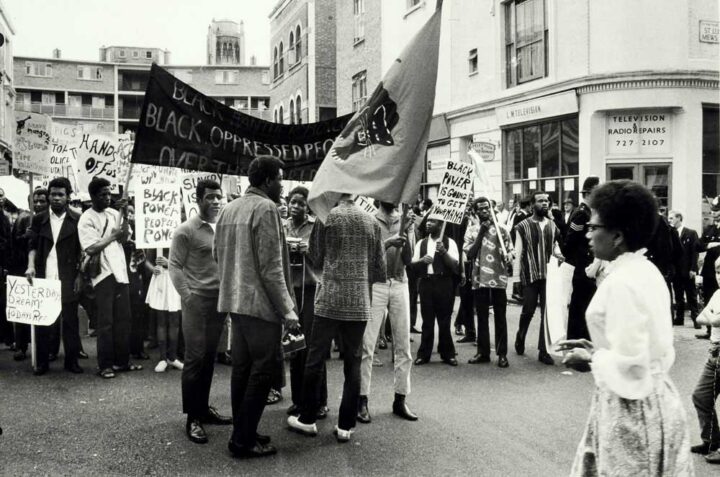
Black Power demonstration in Notting Hill, London 1970 (catalogue reference: MEPO 31/21)
8.1 The government’s response to civil unrest
The British civil rights struggle prompted a backlash from the State and many activists were charged with criminal offences such as riot and disturbance.
Read our overview guides to civil court cases and criminal court cases to learn about what records survive and how to search them.
Alternatively, use the advanced search option in Discovery and search within the records of particular departments such as those listed below. Discovery help explains how to do this.
- Metropolitan Police (MEPO)
- Home Office (HO)
- Director of Public Prosecutions (DPP)
- Assizes (ASSI)
- King’s Bench (KB)
- Central Criminal Court (CRIM)
- Other court records (JUST)
8.2 Civil rights organisations
You can search Discovery for records relating to the various civil rights organisations that formed in the 20th century. Searches for the organisations listed below produce useful results, but there may be other organisations worth searching for.
- Black Power
- Black Panther
- League of Coloured Peoples
- Universal Coloured People’s Association
- Negro Welfare Association
- West African Students’ Union
- West Indian Standing Conference
- Black Unity and Freedom Party
- Campaign Against Racial Discrimination
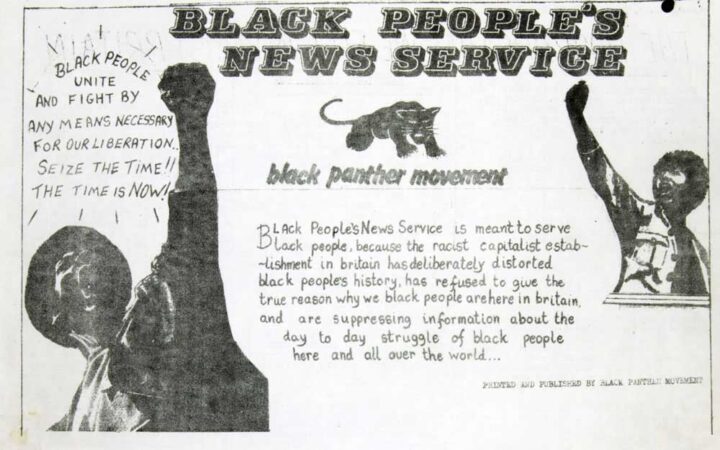
Image of Black Panther movement newspaper 1970 (catalogue reference: MEPO 31/21)
9. Race Relations Board and Commission for Racial Equality
The Race Relations Board was established following the 1965 Race Relations Act. From 1976 this was replaced by the Commission for Racial Equality. The three record series from these and other bodies dealing with the rights and welfare of ethnic minority communities are:
- CK 1 – copies of annual reports
- CK 2 – minutes and papers of the Race Relations Board and local conciliation committees (including cases brought by individuals under the Act)
- CK 3 – minutes and other files of the Community Relations Council
The description of the CK record series explains in more depth what you might find within these records.
Use the advanced search option in the catalogue to search within records from the Commission.
10. Employment and industrial relations
Black Britons have faced discrimination from employers and Trade Unions. The 1948 Nationality Act actively encouraged Caribbean workers to join the British labour force after the Second World War, but they still faced hostility and prejudice in both housing and employment.
To find records relating to employment and industrial relations, search Discovery using terms such as ‘discrimination’ and use the filters to narrow down your results.
Alternatively, use the advanced search option in Discovery and restrict your search to particular government departments such as those below. Discovery help explains how to do this.
- Board of Trade, Department of Employment and Ministry of Labour (LAB).
- British Transport Commission and British Railways Board (AN)
- Records of the Registry of Trade Unions and Employers Associations (NF)
For collections of records held elsewhere see our research guide on Labour history records held by other archives.
11. Records in other archives
There are many useful records held in archives across the UK. Some relevant collections are shown below but this is by no means a comprehensive list.
- The Huntley Archives at the London Archives
- Black Cultural Archives
- Institute of Race Relations
- George Padmore Institute
- Bernie Grant Archive at the Bishop’s Gate Institute
- Local archives – use the Find an archive tool to search for local archives, or search Discovery and refine your results to select records from other archives.
- Historic England – the Slave Trade and Abolition
- British Library
- The Modern Records Centre – includes the archives of the Trades Union Congress, the Transport and General Workers Union and the Confederation of British Industry.
- Church of England Archives – includes material relating to The British Council of Churches and what are known as Black Majority Churches in the UK.
12. Further reading
12.1 Website reading resources
- Black and white on the buses (about the Bristol bus boycott 1963)
- V&A black heritage pages
- Moving Here website
- Black Cultural Archives (see their subject guides)
- The National Archives blogs
12.2 Printed resources
These books are all available in The National Archives’ reference library. You may also be able to find them in a local library. You can buy from a wide range of history titles in our shop.
Peter Fryer, Staying Power (London: Pluto, 1984)
Clive Harris, Configurations of racism: the civil service, 1945-60
Robert Bloody foreigners: the story of immigration to BritainLondon: Little, Brown, 2004)
Adolph Marcus Garvey 1887-1940 London: New Beacon Books, 1967)
Black history: the present in the past London: Sage, 2003)
Black and Asian Studies Association newsletter (London: Black and Asian Studies Association, 1991)
Panikos Panayi, Racial violence in Britain, 1840-1950 (Leicester University Press, 1993)
